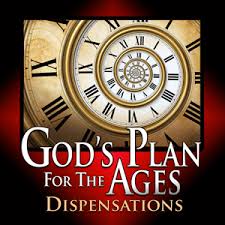The Dispensations of God

One of the most important things in understanding the Bible is rightly dividing the word of truth (Second Timothy 2:15 NJK). There are a number of ways we can divide the Bible to understand the different parts of the whole. One of the ways is by the dispensations contained in God’s Word. To understand what a dispensation is, we need to take a look at two Greek words. The first word is oikumenei from which we get our English word ecumenical. It means to manage, to regulate, to administer, or to plan. The second word is aion and it means age. It emphasizes the time element of the dispensation. So the term dispensation refers to a specific way by which God administers His program, His will, His rule, and His authority. Each dispensation is an age, because each dispensation covers a period of time. Dispensations are periods of time in which YHVH governs in a different way than He did previously.
There are seven dispensations described in the Bible: (1) the Dispensation of Innocence (Genesis 1:28 to 3:8); (2) the Dispensation of Conscience (Genesis 3:9 to 8:14), (3) the Dispensation of Civil Government (Genesis 8:15 to 11:32), (4) the Dispensation of Promise (Genesis 12:1 to Exodus 18:27), (5) the Dispensation of the Torah (Exodus 19:1 to Acts 1:26), (6) the Dispensation of Grace (Acts 2:1 to Revelation 19:21), and (7) the Dispensation of the Messianic or Millennial Kingdom (Revelation 20:1-10). The name Messianic Kingdom emphasizes the fact that God will return to the earth and reign as the Messiah, and the name Millennial Kingdom emphasizes that it will last for a Millennium or a thousand years. Different aspects of the Messianic Kingdom are discussed in other books of the Bible, especially the TaNaKh, one of those being Isaiah.
The key person in the dispensation of the Messianic Kingdom will be Jesus Christ, because Messiah Himself will be providing direct new revelation (2:2-4). This new revelation will be the basis of this new dispensation.
Mankind’s responsibility will be to the B’rit Chadashah, which was the same as in the sixth dispensation. This means accepting the gift of righteousness, which God offers to all mankind, through faith in Yeshua Messiah. But, in addition, obedience to the King and the new commands He will issue will be added. Therefore, in the dispensation of the Messianic Kingdom there will be something old and something new.
The test during that period will be for each one born in the Kingdom to personally receive and accept the King as his or her personal Lord, not in place of the gospel but with the aide of the gospel. To accept the gospel means that one believes that Jesus died for his or her sins, was buried, and rose again (First Corinthians 15:3b-4).
There will also be a failure during the Messianic Kingdom. At the end of the Millennium men and women will fail to recognize Satan’s deception as he leads a rebellion against God and His authority. So many will be deceived, that in number, they will be like the sand on the seashore (Revelation 20:8b). They will be so bold as to try to invade Isra’el and Tziyon.
The judgment will be the total destruction of all these invading armies from around the world by fire out of heaven (Revelation 20:9).
The grace of God will be displayed during the dispensation of the Messianic Kingdom in three major ways. First, there will be the fulfillment of all the prophecies of the TaNaKh (see the commentary on The Life of Christ, to see link click Mu – 354 Prophecies Fulfilled in Jesus Christ). Every prophecy that has remained unfulfilled will find its fulfillment during the Messianic Kingdom. Secondly, it will be a period of prosperity for everyone. Thirdly, there will be immortality for the saved, in that believers will not die. Only unbelievers in the Kingdom will die if they do not accept Christ by the time they are one hundred years old (65:20).
This is the seventh and final dispensation. When it ends, history will move from time to eternity, as it enters the Eternal State (Revelation 21:1 to 22:5).



Leave A Comment